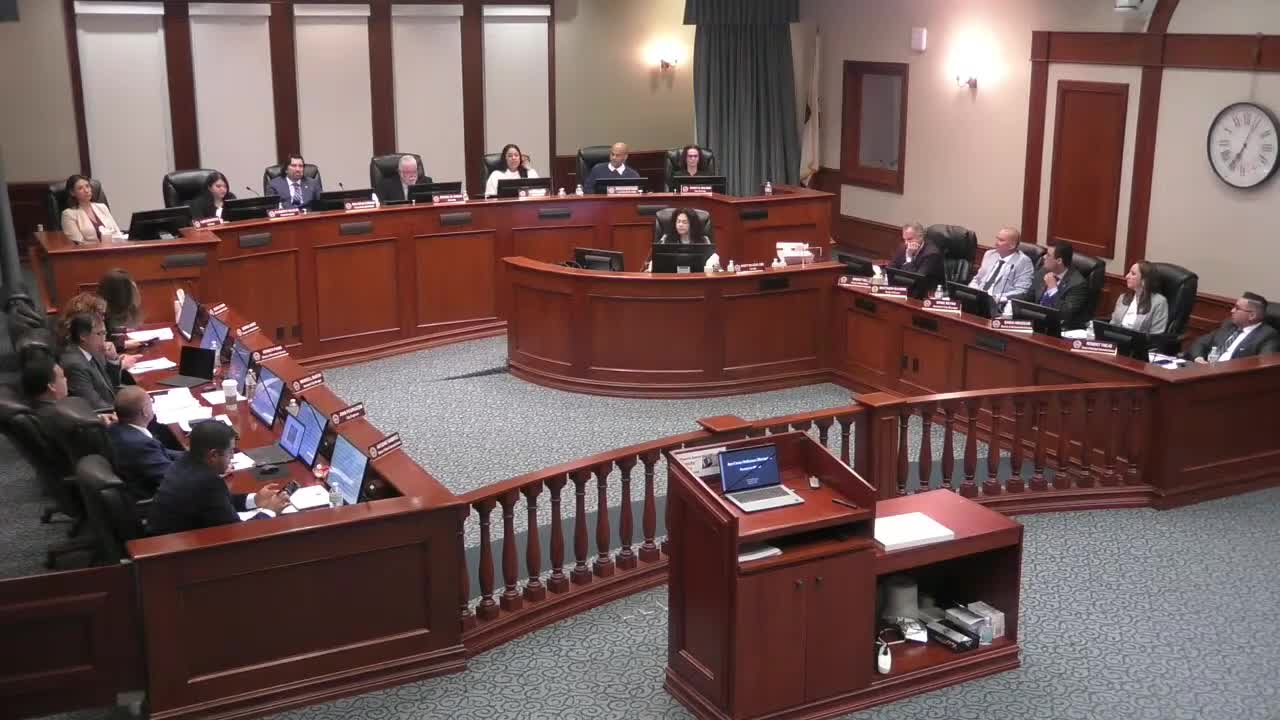Perris council advances local "just cause" discussion, asks staff for ordinance and cost analysis
Get AI-powered insights, summaries, and transcripts
Subscribe
Summary
After hours of public comment and debate, the Perris City Council directed staff to return with a clean local just cause eviction ordinance modeled on state law (AB 1482) and a cost analysis, after hearing residents, tenant advocates and landlord representatives.
The Perris City Council on Oct. 14 heard hours of public comment and a staff briefing on a proposed local “just cause” eviction ordinance under state law AB 1482, then directed staff to return with a draft ordinance and a staffing and budget analysis.
The item, introduced by Michelle Ogawa, Director of Economic Development and Workforce, was described as “a local just cause ordinance pursuant to AB 1482,” and placed before the council after study by the council’s Ways and Means Committee.
Why it matters: The ordinance would create locally enforceable standards for when landlords can terminate tenancies and require relocation assistance in some no-fault evictions. Supporters called the ordinance a needed protection for low‑income families; landlords’ representatives warned of added costs and regulatory complexity.
What staff and speakers said Michelle Ogawa, Director of Economic Development and Workforce, summarized the Ways and Means Committee’s work and the key differences cities can adopt locally from AB 1482 and its amendment SB 567. Ogawa said the committee recommended largely to “mimic AB 1482” on applicability, exemptions and tenant protections but to consider minor local changes such as multilingual notices and specific documentation requirements for criminal‑activity evictions.
Dozens of residents and community organizations urged the council to adopt a local ordinance with stronger relocation payments than the state requires. Luz Gallegos, representing TODEC, said the group “mobilized thousands of petitions in support of this cause,” and asked the council to “bring justice and dignity to our residents.” Maribel Nunez of the Perris Tenant Union and Inland Empire Community Land Trust urged the council to go beyond the state minimums and to consider rent stabilization in future work.
Opposition and legal context Cameron Wessel, representing the California Apartment Association, told the council the association “respectfully opposes the adoption of a local just cause eviction ordinance,” arguing that state law already provides robust protections and that local regulation could add administrative costs and reduce housing supply.
City Attorney’s Office staff member Matt Cohen clarified legal effect and scope: “After a year... you must have just cause to be able to evict someone,” he said, describing how the state law treats periodic tenancies and nonrenewals and the limited exemptions for small owner‑occupied single‑family rentals.
Key policy choices discussed - Applicability: Ways and Means recommended mirroring AB 1482 (protections when a tenant has lawfully occupied the unit more than 12 months, or when at least one resident has lawfully occupied 24 months). The council agreed to that approach. - Exemptions: The committee recommended following AB 1482’s exemptions (short‑term rentals, certain institutional housing, owner‑occupied single‑family homes unless owned by an LLC or corporate entity). Council accepted that approach. - Criminal‑activity documentation: Council debated whether to require a police report or allow police incident logs; after discussion the council agreed to require documented police records (police report or incident log) to support criminal‑activity grounds. - No‑fault bases and qualifying family members: The council discussed expanding the list of relatives who may qualify for owner move‑in (adding great‑grandparents, great‑grandchildren and certain in‑laws) and accepted that expansion for discussion. - Relocation assistance: The state minimum under AB 1482 is one month’s rent (or waiver of the final month). Comparative cities presented by staff show higher local amounts (Antioch: two months at current rent; Baldwin Park: 2.5 months at HUD fair market rent). The council did not set a final local relocation amount and asked staff for cost estimates.
Council action and next steps The council did not adopt a final ordinance on Oct. 14. Instead it gave staff direction to prepare a clean draft ordinance incorporating the agreed items, plus a fiscal and staffing impact analysis, and return with that package at a later meeting. The council also asked staff to include analysis of examples from Antioch and Baldwin Park and to estimate enforcement costs and potential revenue sources (fees, civil penalties).
What the discussion did not decide The council did not adopt rent stabilization, a fixed relocation assistance amount above the state minimum, or final enforcement staffing levels on Oct. 14. Those items remain for future ordinance drafting and budget review.
Ending note Supporters and opponents both asked for outreach and education: the Ways and Means committee and council members emphasized that any local law would need a public education program and clear implementation steps before an ordinance would be adopted and enforced.
